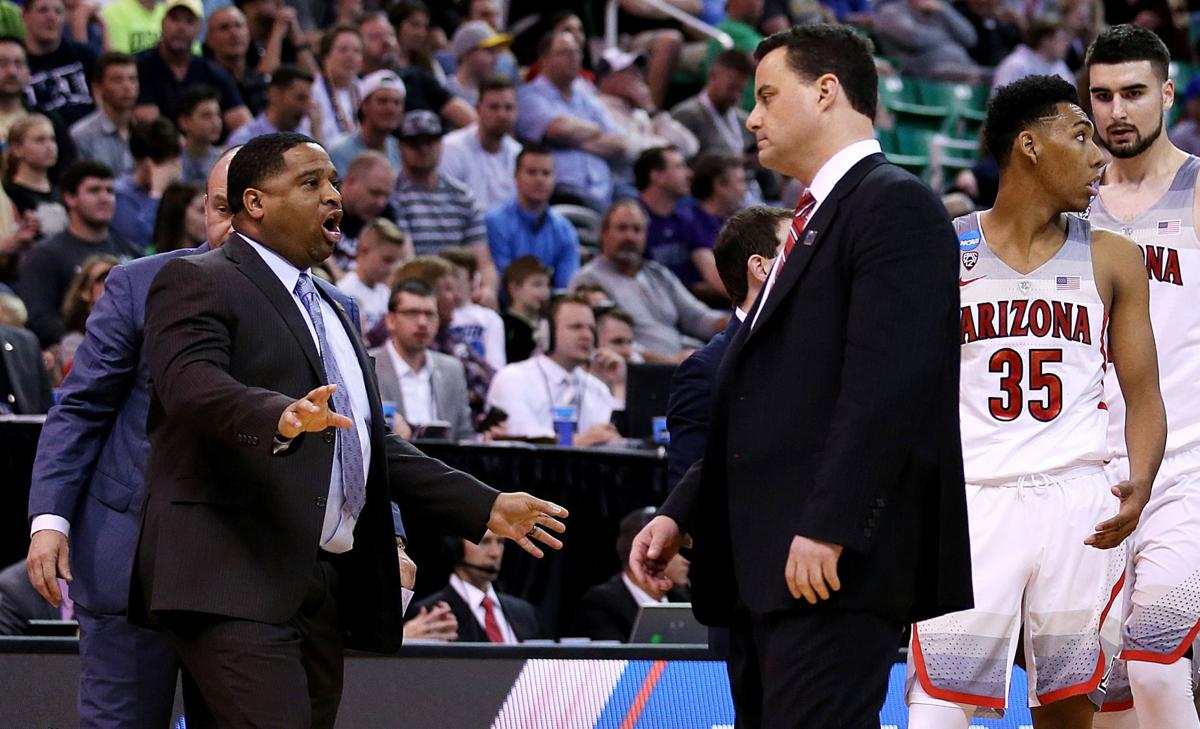If the three cases the Independent Accountability Resolution Process has now settled are any precedent, Arizona’s men’s basketball program likely won’t face an additional postseason ban.
The IARP handed Louisville a two-year probation and several other minor penalties Thursday and has now finished half of its six cases, none of which have resulted in a postseason ban. Arizona, Kansas and LSU are still awaiting their IARP fates, which cannot be appealed. All three remaining cases involve significant Level I (most serious) charges: LSU is facing seven of them, while Arizona and Kansas are each facing five.
The IARP’s hearing panel ultimately did not discipline former Louisville coach Rick Pitino nor place an NCAA Tournament ban on the Cardinals after the school faced six NCAA allegations, including a Level I charge involving the recruitment of Brian Bowen. Instead, Louisville was handed a $5,000 fine, recruiting restrictions and a two-year probation. The IARP issued a one-year probation and a scholarship loss to N.C. State in December 2021; in September, it levied a three-year probation (but no ban) on Memphis.
The IARP did issue two-year show-cause penalties to two former Louisville assistant coaches, Kenny Johnson and Jordan Fair. It also issued several recruiting restrictions.
The cases facing Arizona and Louisville are different.
Louisville faced only one Level I charge while UA faces five, and one of the charges facing Arizona involves alleged academic misconduct by former assistant coaches Book Richardson and Mark Phelps. That’s an allegation that could still lead to penalty, even with a 2021 rule change that allows players to be paid for their name, image and likeness.
Pitino faced a Level II charge for a failure to monitor. Former UA coach Sean Miller faces a Level I charge in the same area. Fired by Arizona in April 2021, Miller is now the head coach at Xavier, and any penalties against him could apply there.
Arizona also faces a Level I charge for Phelps’ alleged efforts to cover up a $500 loan he gave a player, and one for Richardson taking $20,000 in bribes, which he admitted to during federal proceedings. Miller received his charge for a lack of monitoring, and the UA was cited for lack of control as an institution.
Arizona is also facing four secondary violations, including a Level II charge against Phelps for the $500 loan; a Level III charge against Phelps for asking a current player to impermissibly help a recruit; a Level II charge against the swimming and diving program for preferential treatment and impermissible tryouts; and a Level II charge against swim coach Augie Busch for lack of head coaching responsibility.
The UA has been bracing for scholarship losses and other recruiting restrictions in the years ahead for penalties associated with Miller’s regime. But UA has been hoping to avoid a postseason ban on top of the one it self-imposed for the 2020-21 season, after which the school fired Miller and replaced him with longtime Gonzaga assistant Tommy Lloyd.
Like Louisville, which fired Pitino and athletic director Tom Jurich, Arizona has changed its basketball staffing significantly since its infractions case began. The only coaching staff member to remain at UA after Miller’s departure is associate head coach Jack Murphy, who has longtime ties to the school and former UA coach Lute Olson.
Still, Stu Brown, an Atlanta-based attorney who works with schools on NCAA infractions cases, told the Star in March 2021 that the NCAA’s original Notice of Allegations “clearly positioned the case as Level I aggravated for the university” based on the five Level I charges and aggravating factors that include allegations that president Robert C. Robbins and athletic Dave Heeke “compromised the integrity of the investigation.”
If the IARP formally processes Arizona’s case Level I-aggravated, the NCAA’s penalty matrix calls for a postseason ban of up to five years.
Arizona’s NCAA case stemmed from information carried over from the federal investigation into college basketball, which became public in September 2017. UA received a Notice of Allegations in October 2020, signaling the NCAA had finished its investigation, and then requested its case be moved off the NCAA’s standard resolutions track to the IARP.
Created on the recommendation of a committee that studied college basketball after the federal investigation, the IARP was designed to handle complex infractions cases with a mostly independent group of investigators and attorneys.
However, the IARP has been criticized for a slow pace with all of its cases. The NCAA announced on Aug. 31 that the IARP would be disbanded after finishing the six cases it has accepted.





